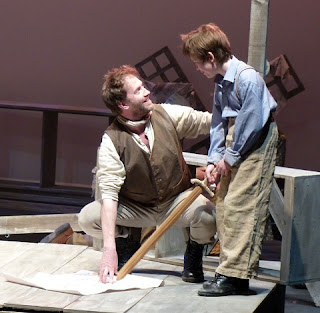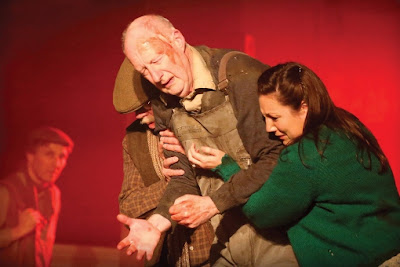 |
| Kirsty Taylor-Stokes, Luke Sinclair Delius: A Village Romeo & Juliet - New Sussex Opera (Photo Robert Knights) |
Reviewed by Robert Hugill on Apr 2 2017
Star rating:
A brave attempt to bring Delius' problematic but intriguing opera to stage life
For its Spring opera this year, New Sussex Opera chose a real rarity indeed, Frederick Delius' rarely A Village Romeo and Juliet. The opera was directed by Susannah Waters, with designs by Anna Driftmier and lighting by Jai Morjaria. Kirsty Taylor-Stokes was Vrenchen and Luke Sinclair was Sali, with Ian Beadle as the Dark Fiddler, Robert Gildon as Manz and Geoffrey Moses as Marti. The conductor was Lee Reynolds with the Kantanti Ensemble in the pit. We saw the final performance of the tour, at the Devonshire Park Theatre, Eastbourne on 2 April 2017.
 |
| Ian Beadle - Delius: A Village Romeo and Juliet New Sussex Opera (Photo Robert Knights) |
Whilst the opera gives us two hours of mature Delius at his prime, the reasons for not staging it are myriad. The rather stilted libretto, Delius' rather cinematic requirements for the staging (six scene changes), the large number of small solo roles, the significant role played by the orchestra with numerous orchestral interludes which play an essential part in the drama, the rather undramatic nature of Delius' genius which makes it so fatally easy to think of the piece as one where nothing happens, and of course the fact that Delius wrote for a huge orchestra (triple woodwind) which means that the singers in the title roles (playing characters who are around 16) need to be positively Wagnerian.
 |
| Robert Gildon, Alex Edwards - (Photo David James) |
New Sussex Opera is a group founded on an amateur chorus and A Village Romeo and Juliet does not give them much to do, so Reynolds and Waters used the chorus to remedy some of the other problems. Eleven smaller roles were taken by chorus members; Driftmier's very effective set was made of wooden elements which was constantly manipulated by the chorus, not only effecting scene changes but by their constant presence creating a sense of the community which puts so much pressure on Sali and Vreli's relationships. This was an opera centred on the concerns of a small town community, something which helped put the plot into context and providing the back-story which Delius omitted.
So did it work?
 |
| Delius: A Village Romeo & Juliet - New Sussex Opera (Photo Robert Knights) |
Reynolds and the Kantanti Ensemble made a strong case for the music, and certainly made the orchestral reduction work. We lacked a certain amplitude in the strings, but got a focused intimacy and some nice solo lines. Unfortunately, the Devonshire Theatre lacks an effective pit so the orchestra was in front of the stage (the first two rows having been removed) which meant that the orchestral sound was a bit more present that desirable. In the first scene, though treble Alex Edwards gave a gallant performance as Young Sali, his lower register was often inaudible and as Nell Parry as Young Vrenchen was matching him for volume, she was not much better. For the adult singers, the vocal lines came over but with the balance favouring the orchestra, we heard very little of the text.
 |
| Geoffrey Moses, Kirsty Taylor-Stokes - (Photo Robert Knights) |
Ian Beadle made a rather wistful Dark Fiddler, emphasising the character's vagabond nature and the seductive idea of otherness, rather than mining the sense of mythic strangeness which can also apply to the character. The fact that we could barely hear his words was very much a disadvantage her, but thankfully Beadle was an expressively physical performer.
Robert Gildon and Geoffrey Moses made strong work of the small roles of the children's father, who develop their dispute over as strip of land into something all consuming. The smaller roles were all characterfully sung and the chorus entered with a will into Waters' concept and really created a sense of community on stage.
 |
| Nell Parry, Ian Beadle, Alex Edwards - New Sussex Opera (Photo Robert Knights) |
But I have great admiration for New Sussex Opera's dramatic achievements with the work, and the way Lee Reynolds drew some fine textures from his players and strong performances from his soloists. And I am extremely glad that the company braved the opera's reputation to give us a chance to experience it on stage.
Elsewhere on this blog:
- Engaging rarities: Handel's Alceste and Boyce's Solomon - concert review
- A glimpse of work in progress: The National Opera Studio at Rhinegold Live - concert review
- Style & poise: Harry Christophers & the Sixteen in Poulenc - CD review
- Mr Handel's Scholars: London Handel Festival gala - concert review
- Angry Mozart & Haydn: City of London Choir & RPO - Concert review
- Sheer enthusiasm keeps the fizz in this glass: Opera Integra in Die Fledermaus - Opera review
- An exploration of 18th century music & dance: London Handel Players, Academy Baroque Ensemble, Mary Collins, Steven Player, Rachel Brown, Adrian Butterfield, Laurence Cummings - concert review
- Purcell from New York: John Scott and the St Thomas Choir of Men and Boys - CD review
- Music in our time: Nine contemporary composers including Adam Gorb and Paul Patterson - Concert review
- Rediscovering Mendelssohn: Liza Ferschtman on her renewed relationship with the violin concerto - Interview
- Home











No comments:
Post a Comment